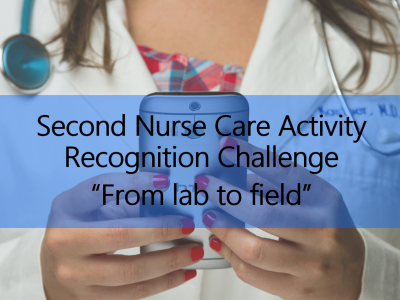Nurse Care Activity Recognition Challenge

- Submission Dates:
-
to
- Citation Author(s):
-
Sozo Inoue (Kyushu Institute of Technology)Paula Lago (Kyushu Institute of Technology)Shingo Takeda (Kyushu Institute of Technology)Alia Shamma (Kyushu Institute of Technology)Farina Faiz (Kyushu Institute of Technology)Nattaya Mairittha (Kyushu Institute of Technology)Tittaya Mairittha (Kyushu Institute of Technology)
- Submitted by:
- Paula Lago
- Last updated:
- DOI:
- 10.21227/2cvj-bs21
- Data Format:
- Links:
- Categories:
- Keywords:
Abstract
Instructions:
*Registration :
Participants should register via IEEE Data Port.
*Eligibility
Challenge is open to students, graduate students, researchers, professors, and data scientists. Employees of Carecom ("Sponsor"), and members or Sozolab ("Organizers") are not eligible to enter or win.
*Challenge
Participants should submit their results in a .csv file with two columns: segment_id and activity_id and one line for each segment in the test data. The test data contains 116 segments.
Submissions will be judged by accuracy.
* Workshop Papers
All participants are encouraged to submit a paper to HASCA Workshop 2019 (http://hasca2019.hasc.jp/) detailing their proposal.
Only participants who submit a paper will be considered for the final ranking.
*One account per participant
You cannot sign up to IEEE DataPort from multiple accounts and therefore you cannot submit from multiple accounts.
*Team Limits
The maximum size of a team is 10 participants.
*Submission Limits
You may submit up to 2 submissions for judging.
*Competition Timeline
Start Date: 26/5/2019 5:00 PM UTC
End Date: 30/6/2019 11:59 PM UTC
Paper submission: 30/6/2019 AoE ( up to 5 pages )




